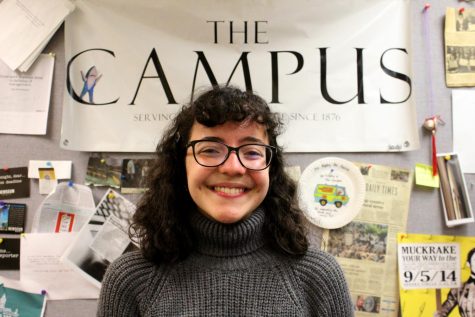Green SOCS, Bednar talk energy disparities
Bednar conducting energy poverty research on fellowship in Chile
The Green Students of Color Society met with Arizona State University Presidential Postdoctoral Fellow Dominc Bednar over Google Meet on Thursday, May 5, to discuss energy equity and energy justice.
“My research principally looks at energy poverty recognition and response in the United States,” Bednar said. “I draw comparisons to the United Kingdom, and then now, also, doing so here in Chile.”
Bednar explained that in his position, he has time to carry out independent research after earning his Ph.D., but after about two years this will convert into a faculty position at Arizona State. He earned his Ph.D. at the University of Michigan in 2021, and he estimated that he will be an assistant professor by the fall of 2023.
Bednar, who is currently located in Chile, has engaged in energy-related projects in Detroit and Arizona. Recently, he said, he was invited to join an advisory board that examines energy justice and equity in the United States.
In a situation where a family is experiencing energy poverty, they may be forced to make sacrifices with food or medicine, Bednar said. They may find themselves unable to have comfortable temperatures in their homes. Their utilities may be shut off.
“My work takes an approach of energy vulnerability to understand, ‘what are these various items or factors that influence the likelihood of people falling into energy poverty?’” Bednar said.
In his work, Bednar argues that the lack of formal recognition for energy poverty limits Americans’ understanding of its causes, which hinders the ability to pinpoint solutions.
Bednar looks at the issue of energy poverty on both a national scale and a more local one. He is trying to figure out how states and utility companies have responded to the COVID-19 pandemic and determine if there are any safeguards implemented to prevent people’s utilities from being turned off.
“In some of my previous work, during my master’s program, just before my Ph.D., I looked at the spatial, racial and socioeconomic disparities of energy consumption, efficiency and affordability,” Bednar said.
This work showed that in Detroit, low-income individuals and communities of color are more likely to live in energy-inefficient homes. Their energy bills are consequently higher in proportion to their income, which Bednar said is termed “energy burden.”
Chile is not a large country, but it is a long country that includes multiple climate regions. Bednar’s initiatives in Chile are meant to see how its government policies support the unique energy demands of people who live in these regions.
According to Bednar, there are three tenets of energy justice: distributive justice, or determining how inequities are spread across various states and identities; procedural justice, or figuring out the part individuals play in their energy decision making; and recognition justice, or acknowledging and responding to the aforementioned inequities.
Bianca Sanchez, ’24, President of Green SOCS, drew a connection between Bednar’s work and the organization’s passions.
“At Green SOCS, a lot of what we try to focus on are the disproportionate impacts of various levels of systemic and environmental justice issues and how they impact communities of color especially, lower income communities,” Sanchez said to Bednar. “So it was very exciting for us to meet with you today because a lot of your research is very similar to some of the things we love to learn about and stand for.”
Green SOCS had prepared a list of questions to ask, the first of which being the most serious effects of energy justice issues on low-income communities of color.
In his response, Bednar mentioned energy poverty and high energy bills as pressing issues. He also pointed out that the COVID-19 pandemic hit people of color especially hard because they often live with many family members, which may interfere with having a learning space in the home, not to mention the fact that Wi-Fi is not universally accessible.
“I think we take for granted that energy literally provides us with much of (these) new-age societal energy services,” Bednar said. “If you live in an energy-inefficient home, and your house is really hot or really cold, it’s not particularly conducive to learning.”
Another question asked for the role of systemic racism in energy injustices. Bednar explained that his work has demonstrated that low-income households tend to be in energy-inefficient homes with out-of-date infrastructure, and these households have the highest energy burdens. Oftentimes, these are formerly-redlined communities, where banks and lenders refused to grant credit and home loans based on a person’s race or ethnicity, or the race or ethnicity of their community. Although there is not a lot of research connecting redlining with high energy burdens, Bednar said, his research has illustrated that connection — literally. He shared photos to support his point. For instance, in the city of Detroit, the oldest homes house the families with the lowest incomes, and Black and Hispanic individuals have the highest energy burdens.
Towards the end of the discussion, Bednar asked students what they want to see in the energy future. Renewable energy proved to be a common wish among several attendants, including Vice President of Green SOCS Gloria Ulloa-Soto, ’25. She hopes to see this energy accessible to everyone.
“In Green SOCS, we talk a lot about this idea of intersectionality,” Ulloa-Soto said. “We talk a lot about the disproportionate effects that are towards low-income communities, communities of color. So even in terms of energy, I think moving forward for the future, I wouldn’t only want to see that improvement in more renewable energy, but accessibility for those communities who we see these effects towards.”

Sofia Hassan is a second-year student from New Castle, Pennsylvania. She plans to major in English Creative Writing and minor in Middle East and North...







